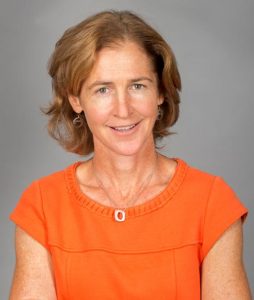 Jessica McAlpine is an Associate Professor in the Department of Obstetrics and Gynaecology at UBC. She is a Gynecologic Oncologist and Translational Researcher with British Columbia Cancer Agency, and has served as Tumor/Tissue Bank Director of OVCARE for Vancouver General Hospital and the BC Cancer Agency since 2012.
Jessica McAlpine is an Associate Professor in the Department of Obstetrics and Gynaecology at UBC. She is a Gynecologic Oncologist and Translational Researcher with British Columbia Cancer Agency, and has served as Tumor/Tissue Bank Director of OVCARE for Vancouver General Hospital and the BC Cancer Agency since 2012.
Dr. McAlpine spent over a decade in the USA completing her medical training. She obtained her Medical Degree at Johns Hopkins University Medical School, Baltimore (1996), and specialized in Obstetrics and Gynaecology during her Residency at Stanford University Hospital, (1997-2001) and Gynaecologic Oncology for her Fellowship which she completed at Yale University, New Haven (2006). She joined the Department of Obstetrics and Gynaecology post Fellowship in 2006.
Dr. McAlpine has been very successful in obtaining numerous competitive operating grants as a Principal Investigator. Most recently she was the recipient of the British Columbia Cancer Foundation Clinician Scientist Award that provides $750,000 over 5 years, a $160,000 Canadian Institute of Health Research proof of principle grant, and a $200,000 Canadian Cancer Society Research Institute grant to study several topics relating to molecular and proteomic classification of endometrial cancer and circulating tumor DNA. These research initiatives are already leading to changes in research approach and stratification of trials and we are working toward implementation in clinical management. She is our feature researcher for November 2016.
What is you day job?
I am an obstetrician and gynaecologist with specialty training in gynecologic oncology. My time is divided evenly between my surgical/clinical role and my translational research. My research takes basic science discoveries and applies them to the clinical setting.
What is your primary research focus?
My research focuses on subtype specific approach to ovarian and endometrial cancers and cancer prevention strategies. One of my current projects involves development and implementation of a molecular classification tool in endometrial cancers to better assess risk of metastases or recurrence. We have demonstrated that this tool can work on diagnostic specimens (e.g. endometrial biopsy) and hope to be able to guide patient management from the earliest time point.
What drew you to that subject?
There is no question that surgery and clinical care are my biggest passions. But in caring for women with gynecologic tumors, it is apparent that the limits in our knowledge are profound, and our ability to direct care that is best for that individual severely limited. This drives me to research; to address some of these challenges in order to hopefully improve things for women in BC in the future. When asking research questions I try to look for what is needed or lacking and what is relevant.
What do you find are the biggest challenges in pursuing research while being a clinician?
Finding the time is one of the biggest challenges in conducting research as a clinician. It is important to have protected research time and to block off time for research in a busy schedule.
What are the greatest supports for your research?
I have been very fortunate to have had incredibly supportive mentorship through OVCARE (Drs. Blake Gilks, David Huntsman, Dianne Miller) and UBC (Dr. Gavin Stuart, and many more). My mentors have helped foster and filter ideas, provided resources and wanted me to succeed. This is rare! The first 5 years are so important when you start your practice. I have no illusions that I would have been able to achieve one tenth of what I have done without support from these mentors and my clinical colleagues.
You have been successful in obtaining funding for your research from the BC Cancer Foundation, Canadian Institute for Health Research and Canadian Cancer Society Research Institute (CCSRI). What advice do you have for junior colleagues looking for research funding?
My advice to new researchers would be to start with small projects and a good research question, and to connect with a mentor when completing funding application. Protected research time if very important early in a researcher’s career and several grants are available that provide salary support for junior researcher, such as VCHRI and the CIHR New Investigator Award. As a Junior Researcher there is also high potential to get seed funding.
What are your future plans and goals? What would you like your research to achieve?
I hope to continue current projects with our OVCARE team and continue to grow in collaborations nationally and globally so that relevant research discoveries translating to change in clinical care can be disseminated on a larger scale i.e. rapid progress from research to the clinic. I have been fortunate to have wonderful mentors and I am now in a position to hopefully help mentor others.
When you aren’t working on your research or as a clinician how do you spend your time?
I enjoy spending time with my family! They are my perspective, support and motivation. We like to camp, hike, surf (poorly) and ski.